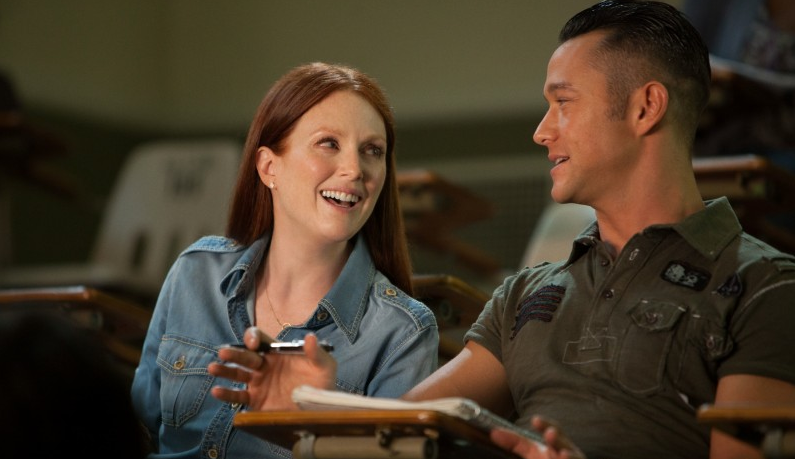
Don Jon opens in theaters nationwide this weekend, but if you’ve recently set foot in a theater, went to WUD Film’s sneak preview last week, or even turned on the television, you probably already knew that. Many a Sportscenter re-run have been punctuated by 30-second TV spots advertising Joseph Gordon-Levitt’s writing/directing debut. As the title character, a “guido with a heart o’ gold,” Gordon-Levitt engages in a shameless pursuit of Scarlett Johansson’s Barbara Sugarman. The television ads show them flirting over lunch, holding hands at the movie theater, and even having hilarious arguments. By the looks of it, Don Jon’s got all the makings of a feel good, sassy romantic comedy.
Except that’s not Don Jon. Not much of it, at least. What its theatrical trailer fluffs up — and what at least two of its television spots completely ignore — is Jon’s addiction to internet pornography. Gordon-Levitt mines the recognizable hum of his Macbook coming to life for a solid recurring gag, but Jon’s obsession with porn ceases to be merely an amusing character trait when it starts interfering with his daily routines. Jon masturbates after bedding girls from the bar, even sneaking a quick 30 second clip on his phone in the car. Or during class. Don Jon — originally titled a more dour Don Jon’s Addiction — is about these disruptions and its main character’s ignorance to that hard truth, and its advertisements seem keen on shying away from that.
Sure, details like these aren’t the easiest to get across in short, widely-publicized commercials, but the entirety of Don Jon’s marketing campaign is poised to set up audiences for disappointment. One 30-second TV spot, “Call Me,” chops up a pivotal moment of intimacy between Jon and Barbara, all for the sake of maximum humor and sensuality. “The Long Game” sets up a feisty game of cat-and-mouse between the two, implying the film stretches out Jon’s courtship over much of its runtime. It doesn’t. “Amen” gives a more honest representation, bothering to touch on Jon’s addiction and its potential effects on his relationships. Thanks to the spot’s use of Marky Mark and the Funky Bunch’s “Good Vibrations” though, Jon’s addiction feels petty and weightless, a minor speed bump on the road to the Jersey Shore comedy hour.
Don Jon is often very funny, with Gordon-Levitt using big and admittedly one-dimensional characters for laughs, but its marketing’s omission of Julianne Moore’s Esther, an unfashionable 40-something classmate, undercuts a character whose ultimate role in the film is a far more significant one than Barbara’s. More importantly, Moore’s absence encourages unrealistic expectations in those who see Don Jon. Joseph Gordon-Levitt’s debut doesn’t completely earn the sobering half-revelation it ends on, but it’s a stylish film with a solid point or two on the influential power of the “image” – whether it be pornography, a Carl’s Jr. commercial, or a run-of-the-mill rom com. For a film marketing to moviegoers itself as the latter, that seems more than a little ironic.
